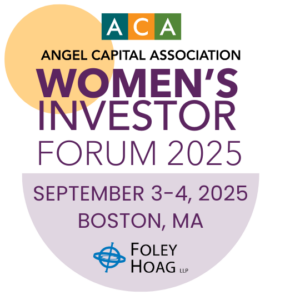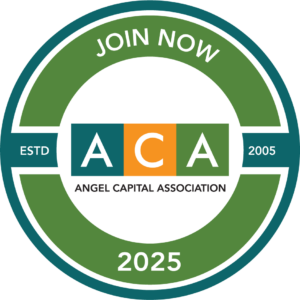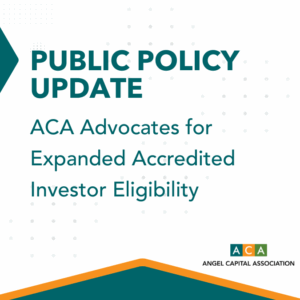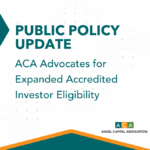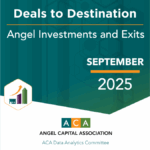The Angel Capital Association (ACA) continues to be a strong voice in Washington on behalf of angel investors. This week, ACA participated with coalition partners from the Accredited Investor Alliance (AIA) in a meeting with the U.S. Securities and Exchange Commission (SEC) Corporate Finance (Corp Fin) division to discuss updates to the definition of “accredited investor.”
The purpose of this dialogue is simple but important: to responsibly broaden investor eligibility while maintaining investor protections.
Why This Matters
The current accredited investor definition relies heavily on income and net worth thresholds, excluding many individuals who have the knowledge and sophistication to invest in early-stage companies. ACA and our partners believe financial acumen cannot be measured solely by wealth. Instead, additional pathways should exist for individuals to qualify, such as:
- Working with a registered investment adviser (RIA) or broker-dealer (BD).
- Holding relevant professional credentials.
- Demonstrating job experience in financial or investment fields.
- Passing an examination to demonstrate sophistication.
These updates would reflect the evolving role of private markets in capital formation, help support more investors in reaching their retirement goals, and expand access to capital for startups and small businesses.
ACA at the Table
ACA CEO Patrick Gouhin, along with ACA board member Clay Rankin and government relations consultant Blair Hancock, joined coalition partners including Carta, Engine, the Institute for Portfolio Alternatives, and others in the September 24 meeting with SEC staff. Together, the group underscored that broadening the accredited investor standard responsibly would open doors for qualified investors while preserving vital protections already in place.
As Pat shared with members, one of ACA’s goals is to see whether the ACA Angel University curriculum could one day serve as a recognized “on-ramp” to accredited investor status. While not yet a formal proposal, this idea would allow investors to demonstrate their sophistication through structured education—something ACA is uniquely positioned to provide.
Building Momentum
Momentum is building nationally. Congress has passed several bipartisan bills aimed at expanding investor eligibility, and the Administration has directed the SEC and Department of Labor to review policies that could democratize access to alternative assets for retirement savers. This creates a critical opportunity for ACA and our partners to help shape the future of investor access.
Our Commitment
As the voice of the angel community, ACA is committed to ensuring that policymakers understand the value angels bring to capital formation and entrepreneurship. We will continue to advocate for policies that expand access responsibly and support our members’ ability to invest in the next generation of companie

